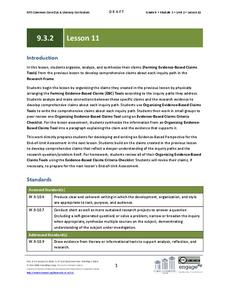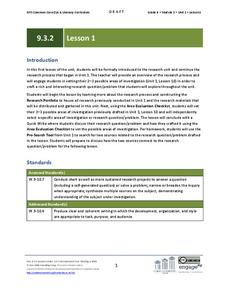University of Minnesota
Inquiry Cubes
How do you teach kids to "science" effectively? Inquiry cubes are a "sort of" puzzle with no answer—promoting even more questions! Group members work together to use the evidence on the visible sides of each cube to infer what lies on...
Historical Thinking Matters
Spanish-American War: 5 Day Lesson
Nine historical documents, an interactive online notebook, and a fantastic opportunity for historical inquiry await your pupils in this 5-day lesson plan. Class members identify and discuss various causes for the Spanish-American War...
EngageNY
Grade 9 ELA Module 3, Unit 1, Lesson 5
Ninth graders study the study of animals in an informational text lesson plan that focuses on analyzing text structure. As learners continue reading the first chapter of Temple Grandin's Animals in Translation, they form inquiries and...
EngageNY
Grade 9 ELA Module 3, Unit 2, Lesson 4
It seems like the first result in a search engine is the best source, but how can you be sure? An activity on assessing sources guides ninth graders through an integral part of their inquiry-based research project, based on questions...
EngageNY
Grade 9 ELA Module 3, Unit 2, Lesson 6
Having formulated a list of inquiry questions based on a reading of Temple Grandin's Animals in Translation, high schoolers complete a frame tool for their research. They categorize their questions based on preliminary research and trace...
EngageNY
Grade 9 ELA Module 3, Unit 2, Lesson 9
Part of being a strong researcher is knowing if you're headed in the right direction. Class members study their research frames formulated in the previous lessons of the unit and decide what parts of their inquiry paths need revision or...
EngageNY
Grade 9 ELA Module 3, Unit 1, Lesson 8
Have you ever wanted to learn more about a subject after you finished a great book? Guide ninth graders through an inquiry-based research project as they finish the first chapter of Temple Grandin's Animals in Translation. Having...
EngageNY
Grade 9 ELA Module 3, Unit 2, Lesson 2
Focusing on a specific inquiry and area of investigation, ninth graders continue their research projects and portfolios based on Temple Grandin's Animals in Translation and their questions. The activity guides readers through the...
EngageNY
Grade 9 ELA Module 3, Unit 2, Lesson 10
Ninth graders continue their inquiry-based research projects focused on the topics in Temple Grandin's Animals in Translation. After formulating, honing, and adapting their research frames in the previous lessons, learners select...
EngageNY
Grade 9 ELA Module 3, Unit 2, Lesson 7
Now that learners have honed their inquiry-based projects down to their strongest few questions, they can conduct independent research. High schoolers pursue answers to their inquiries while assessing sources, establishing a research...
EngageNY
Grade 9 ELA Module 3, Unit 2, Lesson 8
Learning about research can be as important as learning about the topic itself. As ninth graders continue their guided research projects from Temple Grandin's Animals in Translation, they discuss their possible inquiry paths with group...
EngageNY
Grade 9 ELA Module 3, Unit 2, Lesson 11
Asking questions often leads to more questions. In a research instructional activity based on Temple Grandin's Animals in Translation, ninth graders formulate claims based on the synthesis and analysis of each of their inquiry paths. A...
EngageNY
Grade 9 ELA Module 3, Unit 1, Lesson 1
Clear up the misconceptions about autism and individuals on the autism spectrum with an inquiry-based instructional activity. As ninth graders read the first four pages of Temple Grandin's Animals in Translation: Using the Mysteries of...
EngageNY
Grade 9 ELA Module 3, Unit 2, Lesson 12
Ninth graders synthesize their inquiry paths, research process, and claim formulation with a writing assessment at the end of the unit. Learners write a one-page perspective about their conclusions from the research process and outcomes...
EngageNY
Grade 9 ELA Module 3, Unit 1, Lesson 4
Can dogs feel shame? Explore the anthropomorphic connection between human emotions and animal behavior—or lack thereof—with a activity about Temple Grandin's book, Animals in Translation. Ninth graders continue a close reading of chapter...
Towson University
Mystery Disease
How did scientists determine the cause of illness before technology? Science scholars play the role of medical researcher in an engaging guided inquiry activity. Using observations, technical reading, and Punnett squares, learners...
Curated OER
Lesson Plan: The Tour Starts at Noon
The Eleven-Headed Bodhisattva is a piece that represents characteristics, meanings, and ideals common to those who practice Buddhism in Japan. Learners fully analyze this piece, then take a virtual trip to examine the Buddhist temples...
Howard Hughes Medical Institute
Lesson 3: Scientific Inquiry with WildCam Gorongosa
When biologists installed cameras in Gorongosa National Park, they ended up viewing a lot more than the lions they were trying to help! Young ecologists observe one of Africa's most beautiful savanna regions with interactive trail camera...
EngageNY
Grade 9 ELA Module 3, Unit 2, Lesson 3
Ninth graders hone their research questions in a lesson focusing on accurate search engine techniques. Continuing a unit on inquiry-based learning based on Temple Grandin's Animals in Translation, the lesson guides learners through the...
EngageNY
Grade 9 ELA Module 3, Unit 2, Lesson 1
High schoolers apply sophisticated research skills to an inquiry-based project connected to Temple Grandin's Animals in Translation. Working from the prior unit and the model areas of investigation, including animal intelligence,...
EngageNY
Grade 9 ELA Module 3, Unit 1, Lesson 6
Are cattle prods beneficial for herding cattle, or do they cause more harm than good? Investigate Temple Grandin's claim about animal behavior with a lesson that focuses on pages 20-23 of the first chapter of her book, Animals in...
Curated OER
What Is an "Inquiry Lesson"?
Students complete inquiry projects. In this historical perspectives lesson, students conduct their own research on topical historical questions their instructors suggest. Students then locate historical evidence and analyze it to learn...
ReadWriteThink
Literature Circles: Getting Started
Make reading more enjoyable and interactive with literature circles! Here you'll find detailed lessons to begin the literature circle process. Ten lessons introduce each role learners take on. Literature circle roles include...
Historical Thinking Matters
Rosa Parks: 5 Day Lesson
What led to the success of the Montgomery Bus Boycott, and how might historians approach this question differently? This rich series of lessons includes a short introductory video clip, analysis of six primary source documents, and...

























